A Privilege Primer, Part III: Reconsidering accountants’ tax services as legal services
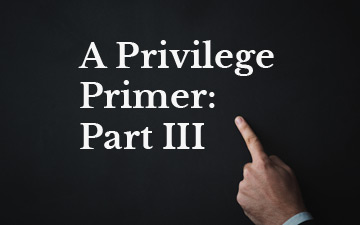
In the third of a three-part series on the Gaudreau case before the FCA in Quebec, Brian Studniberg of Henein Hutchison Robitaille LLP concludes his thoughts on situational forms of privilege between tax accountants and their clients
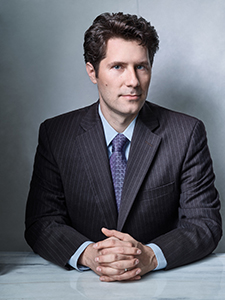 |
Brian Studniberg is a partner at Henein Hutchison Robitaille LLP where his practice focuses on tax disputes in both civil and criminal matters including with the Canada Revenue Agency and before the courts. |
LET’S review where we’ve been. In the first part of this series, the facts of a recent case before the Tax Court of Canada, Gaudreau c. Le Roi, 2023 CCI 115 (and currently under appeal to the Federal Court of Appeal), were reviewed with an eye towards addressing whether documents created in the course of an accountant’s direct dealings with a client for tax advice could be protected by legal advice privilege (or “solicitor-client” privilege). Gaudreau reasserts the established law that there is no accountant-client privilege in Canada, at least as a matter of a class-based legal privilege. In part two, we pulled back somewhat to consider different types of legal privilege with reference to how privilege could be extended to cover the work product of tax accountants under existing legal authority in Canada.
In this final part, we are now going to revisit the presumption that the tax advice provided by professional accountants to their clients in Canada does not obtain legal protection from compelled disclosure. Gaudreau seems to have left open the possibility that clients could seek to protect their accountants’ tax advice through invoking a case-by-case form of privilege. It is fair to say that the courts and Parliament in Canada are unwilling to seriously reconsider the foundations of legal privilege and whether or not those tenets extend to professional accountants providing tax services to their clients. Faced with that reality, it may be worthwhile for some taxpayers to evaluate whether they might wish to claim a situational form of privilege over the tax advice provided to them.
Rationale for Legal Advice Privilege
The basis for protecting communications made in the furtherance of seeking legal advice may seem straightforward, but it is worth parsing for its implications. A classic statement of the rationale would assert that “by reason of the complexity and difficulty of our law, … it is absolutely necessary that a man … should have recourse to the assistance of professional lawyers… to use a vulgar phrase, that he should be able to make a clean breast of it to the gentleman whom he consults with a view to the prosecution of his claim, or the substantiating of his defence.” In other words, the client “should be able to place unrestricted and unbounded confidence in the professional agent”.
That statement is made in Anderson v. Bank of British Columbia, an 1876 decision by the English Court of Appeal. It is quoted in R. v. McClure, 2001 SCC 14, a rather more recent judgment from the Supreme Court of Canada, which rephrased the point in modern language: “Free and candid communication between the lawyer and client protects the legal rights of the citizen. It is essential for the lawyer to know all of the facts of the client’s position,” adding that it is the fact that a right to privilege exists which encourages candid disclosure within the solicitor-client relationship. “The danger in eroding solicitor-client privilege is the potential to stifle communication between the lawyer and client. The need to protect the privilege determines its immunity to attack.”
Solicitor-client privilege relates to seeking legal advice. In the previous article, we noted in passing that documents which pre-exist the lawyer-client relationship will not become privileged merely for being deposited with a lawyer. Things change when the communication is made with reference to considering what a client might do in a particular situation. Legal advice, of course, is not just forward-looking, as it could also apply to the evaluation of past actions, but the essential point is that it involves the use of legal analysis particularized to the client’s personal situation.
The reference point for the privilege, as the traditional “solicitor-client” label has it, is properly the client’s need for legal advice, not to protect the professional interests of the lawyer. Quoting Greenough v. Gaskell, an 1833 English case, the Supreme Court of Canada in 1979 emphasized that the administration of justice “cannot go on without the aid of men skilled in jurisprudence, in the practice of the courts, and in those matters affecting rights and obligations which form the subject of all judicial proceedings.” Were there to be no privilege, the court added, “a man would not venture to consult any skilful person, or would only dare to tell his counsellor half his case”. (See Solosky v. The Queen, [1980] 1 SCR 821.)
But while the advice is properly examined from the perspective of the client ultimately seeking it, the advice does not need to be rendered in regard to an adversarial legal process. Much of the ordinary work performed by lawyers qua solicitors does not relate to the courtroom, for instance, but rather to buying or selling property, entering into other transactions, or attending to required declarations of legal status for their clients.
And it’s here that accountants generally re-enter our story. It is not controversial to recognize that a great share of the professional tax assistance provided to a client with regards to particular transactions a client might make (think of an owner-operator of a small business corporation) comes from the accountant along with virtually all of the work in helping a client to prepare its tax and information returns. But the Income Tax Act is just one statute among many, and it has long since been established that the rules of statutory interpretation for tax legislation aren’t really different than they are in any other area. Tax law may be complex law, but it isn’t special law.
Doesn’t that tend to insinuate that accountants providing advice on compliance with tax legislation are providing legal advice? Short answer: Yes. Longer answer: Still yes.[1] So why is it that accountants in Canada aren’t able to protect their communications with clients in the same way that lawyers can when both are providing tax advisory services?
In 2003, Canada’s Federal Court of Appeal closes the door on accountant-client privilege
The leading Canadian authority holding that there is no “accountant-client” privilege in Canada remains the Federal Court of Appeal’s decision in Tower et al. v. Minister of National Revenue, 2003 FCA 307. At issue in that case was whether tax advice provided by an accountant in relation to a transaction undertaken by the taxpayer was compellable. The taxpayer, seeking to protect an accounting firm’s analysis, argued that both a class or, alternatively, case-by-case privilege were made out. The Federal Court of Appeal was not persuaded on either score.
On a class-based privilege akin to solicitor-client privilege, the Federal Court of Appeal stated that “[l]awyers are legally and ethically required to uphold and protect the public interest in the administration of justice,” but, in contrast, accountants are not. Moreover, the Court of Appeal added, accountants do not provide legal advice as they are not regulated legal professionals.
Then, on a case-by-case privilege, the Federal Court of Appeal set out the well accepted four-part framework. As noted in the first part of this series, the “Wigmore criteria” are, first, that the communications originate in the confidence that they will not be disclosed; second, that this confidentiality is essential to the relationship between the provider and receiver of the communication; third, that the community is so minded to protect the type of relationship at play; and, finally, that the harm arising from the disclosure of the communications would be more heavy than the benefit gained from the disclosure (in the sense, for instance, that doing so would render it more likely that the case would be correctly decided).
The Federal Court of Appeal’s approach to each element in Tower went as follows: While an accountant is required under the governing rules of professional conduct to keep client communications confidential, the accountant knows that confidentiality may be required to give way to the CRA’s greater power to require disclosure. Indeed, for much the same reason, the relationship between accountant and client does not depend on confidentiality for its existence; after all, taxpayers regularly seek tax advice from accountants knowing that they are not lawyers and therefore cannot offer solicitor-client privilege. Similarly, it cannot be said that public opinion would hold that the tax accountant and client relationship is one that should be “sedulously fostered” to the point of attracting privilege against compelled disclosure: “The worst that could happen if a person is discouraged from seeking income tax advice is that the person might fail to take advantage of a tax saving opportunity, unfortunate perhaps, but not a threat to one’s physical, mental or spiritual well being.” Lastly, the balancing of interests favoured disclosure: Taxpayers continue to seek out tax advice from accountants despite knowing that the communications with accountants are not protected in the same way as that coming from lawyers, and obviously curtailing access to documents arising in those communications could prevent the correct disposition of the particular case.
The reluctance of the courts to provide for new forms of class-based (blanket) legal privilege is not at all surprising. In rather different contexts, both the Supreme Courts of Canada and the United Kingdom have suggested that a new category of class privilege will likely need to come from Parliament. (See R. v. National Post, 2010 SCC 16, and Prudential plc v. Special Commissioner of Income Tax, [2013] UKSC 1.)[2]
The Supreme Court of Canada also made what is perhaps a more apt observation in passing. In the important case Blank v. Canada, 2006 SCC 39, well known for its treatment of litigation privilege, the Court explained that “[s]ociety has entrusted to lawyers the task of advancing their clients’ cases with the skill and expertise available only to those who are trained in the law”.
In 2023, the Tax Court of Canada reopens the door (slightly) for a situational privilege
Part one of this series noted that, in its reasons in Gaudreau, the Tax Court accepted the position of both the taxpayer and the Crown that the accounting firm’s tax memo was not protected by solicitor-client privilege, but the Tax Court also cited to Tower for the point.
Nonetheless, the Tax Court observed that the taxpayer did not press the alternative argument that a case-by-case privilege could be made out. Unsurprisingly, then, the Tax Court did not dwell on the issue. But we’re not bound by the taxpayer’s choice of what arguments to bring on its appeal. So, as a thumbnail sketch, here is what a more contemporary treatment of the Wigmore criteria in a case like Tower could look like.
An accountant is a regulated professional in Canada and operates under rules requiring the accountant to maintain the confidentiality of client communications. The accountant is sometimes best placed (i.e., better than a lawyer) to offer the client tax advice, both for completing a tax return or for planning a transaction. In the same way that a client’s need for advice is best served by full and frank disclosure with a lawyer, the client being entirely candid with an accountant ensures the most responsive tax advice to the client. And much more is at stake for a taxpayer than a mere tax savings opportunity: modern tax law seeks to do far more than just raise revenue for government coffers and compliance in many sectors can be fiendishly difficult. (In any event, despite policy-based arguments to the contrary, solicitor-client privilege is not restricted only to litigation but applies in a transactional setting as well.)
The final point may be the kicker. What the client is seeking from an accountant is legal advice. The cases and commentary are replete with statements asserting a putative equivalency between much of what a tax accountant and tax lawyer would advise in a given situation. Assuming this equivalency holds, the same advice coming from an accountant should be afforded the same judgment as to the need for its protection. The search for truth should be subordinated to the client’s need for legal advice, after all, and not to the client’s need for consultation with a lawyer.
Although the ramifications of this type of argument will have to be addressed elsewhere, this approach does not necessarily mean that it is open season for privilege claims. The analysis, after all, is seeking a case-by-case privilege, meaning that it presumptively does not apply. And it is the situational aspect of the analysis which bears emphasis here: Despite our assumption of near-equivalency, the lawyer and accountant are certainly not the same when providing that advice on matters of tax law.
In the second part of this series, we noted that there are circumstances in which legal advice privilege can be extended to cover accountants where their “function” is essential to the client obtaining legal advice. We can also see a similar rule at work when considering, say, inhouse or government lawyers whose roles sometimes involve providing business or policy advice and not just legal advice; legal advice privilege, sensibly enough, only covers such persons when the context of the particular relationship and advice sought relate to legal matters.
Conclusion: Confidentiality for Canadian accountants is increasingly important. But is their tax advice privileged?
As an anecdotal observation, but with some legislative imprimatur behind it, the Canada Revenue Agency has become more assertive in recent years in seeking accountants’ tax work product during the course of a taxpayer audit. (See, e.g., the discussion included in CRA policy statement AD-19-02R.) The revised mandatory disclosure rules potentially applicable to both lawyer and accountant alike but with their exemption for disclosure that would infringe “solicitor-client privilege” (as defined in the Income Tax Act) in some ways drives the point home.
The place where this series has to end — at least for now — will be unsatisfying for some readers. The Federal Court of Appeal may be persuaded to address some of this terrain when it hears the appeal in Gaudreau, likely later this year. Then again it might not, particularly if the court believes it can decide the appeal without having to wade into what would be a contentious argument.
And who could blame the court? This whole area is fraught. Whenever the issue makes its way to court again, though, the taxpayer will be well advised to consult with a lawyer. No, despite the foregoing that is not a joke. The problem potentially invokes constitutional considerations, professional regulation, public policy, and more, as well as the kinds of legal analysis Canada’s professional accountants are not trained to perform. Tax advice is legal advice, but accountants and lawyers have different skills and experiences, at least as a general proposition. None of that takes away from the contention, fairly well established by this point, that in many ways a client would be hard pressed to distinguish the advice from a tax accountant from that of a tax lawyer in many of the types of situations that would cause a client to seek that advice in the first place. So maybe the next step means going back to first principles.
FOOTNOTES
[1] See the discussion of this point included in Brian M. Studniberg, “The UK Supreme Court Rekindles the Debate Over a Privilege for Accountants” (2013) 61:2 Canadian Tax Journal 444.
[2] The Canadian Institute of Chartered Accountants attempted to make the case in 2013 to no avail. See “The Case for Privilege for Qualified Tax Professionals in Canada”.
Read all three parts in this three-part series:
A Privilege Primer, Part I: Gaudreau reminds that there is no accountant-client privilege in Canada. But why?
A Privilege Primer, Part II: Where do accountants fit in under existing Canadian law?
A Privilege Primer, Part III: Reconsidering accountants’ tax services as legal services
Brian Studniberg is a partner at Henein Hutchison Robitaille LLP where his practice focuses on tax disputes in both civil and criminal matters including with the Canada Revenue Agency and before the courts. Author photo courtesy Henein Hutchison Robitaille LLP. Title image: iStock (modified).


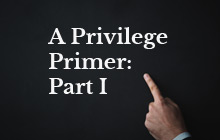
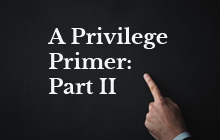
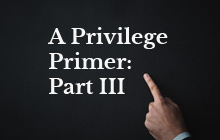
(0) Comments